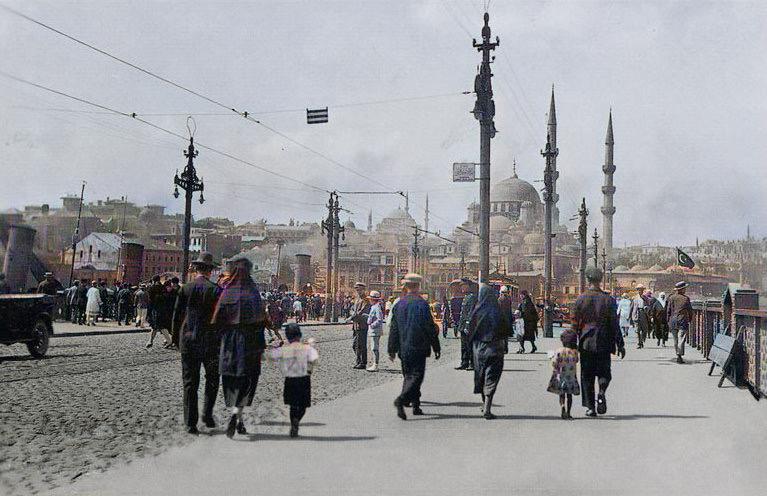.jpg)
IF TIME DOES NOT ADJUST TO YOU, THEN YOU ADJUST TO TIME!
In the past, I would sometimes hear some people around me say when a religious topic was mentioned, “Time does not adjust to man; man must adjust to time!” I used to wonder about the meaning of this phrase, but I also sensed that it was an evasive expression.
Thinking, “If anyone knows, he knows!” I once went to ask the elderly preacher of our neighborhood mosque, Necmi Şamlı Hodja. He said, “This phrase belongs to Ali ibn Abi Talib and concerns the upbringing of children.”
Ali ibn Abi Talib, upon hearing complaints from people struggling to raise their children, asked, “According to which principles are you raising them?” They replied, “Of course, as we have seen from our fathers.”
Thereupon, he said, “Do not raise your children according to the methods you learned from your fathers; rather, raise them according to the requirements of the time. If time does not adjust to you, then you adjust to time!”
Every Era Has Its Own Rules
Later, I learned that the original phrase was “Likulli maqāmin maqāl wa likulli zamānin rijāl.” Undoubtedly, this expression perfectly reflects reality. It means, “Every place has its own words, and every era has its own people.”
Another version appears in a poem by Ziyab ibn Ganim: “Likulli zamānin dawlatun wa rijālun,” meaning, “Every era has its own rule and its own people.” Some even claim this phrase is a hadith (saying of the Prophet Muhammad).
It also serves as a commentary on the 140th verse of Surah Al Imran: “Such days (of varying fortunes) We alternate among the people,” meaning that circumstances shift, sometimes in favor and sometimes against certain people.
The term “dawlat” in this context refers to change and transformation. Seydi Ali Reis also said, “If you see that time does not adjust to you, then you adjust to time!” This refers to changes in customs and traditions.

The West and the East
From the 18th century onward, the Christian Western world surpassed the Islamic world in military, economic, and technological terms and even began to threaten it. Many Muslims of that time were well aware of this.
As the gap widened in the following century, two different tendencies emerged regarding how to resist these threats.
The first tendency held that in order to progress, it was necessary to completely imitate the West in every aspect without any restrictions. According to this view, everything from worldviews to religious institutions needed modernization.
Some of these individuals attributed the West’s advancement to Christianity and blamed Islam for the East’s decline. However, what truly influenced the West’s progress was the decline of Christianity’s influence, not its presence. The West succeeded not because it remained Christian but because it distanced itself from the dogmatic Christian beliefs that condemned the world and glorified only the afterlife.
Indeed, there were and still are deeply Christian countries that remain underdeveloped in terms of civilization. Most African governments, especially Ethiopia, as well as all Latin American states, are strongly tied to Christianity.
How to Adjust to Time?
The second tendency in the Islamic world argued that Muslims had fallen into this situation because they failed to fully adhere to Islam’s commands and instead clung to bid‘ah (innovations in religion) and superstitions. Therefore, they believed the solution lay in returning to the true teachings of Islam.
However, even within this group, there were significant differences in opinion. One faction advocated for reinterpreting Qur'an and the Sunnah of the Prophet through new perspectives and in accordance with contemporary conditions—especially regarding issues like the prohibition of interest, polygamy, gender segregation, women’s inheritance rights, work, and testimony.
Authors like Ziya Gökalp (whose works were particularly influential in shaping the reforms of Mustafa Kemal and the modern Republic of Türkiye) interpreted the Quranic verse “Command what is customary” to mean that traditions take precedence over religion. However, in reality, “custom” here refers to practices that align with both religion and reason. It is evident that the Prophet Muhammad did not simply endorse the existing customs of his time but rather changed most of them.
Returning to the Past?
Conversely, another group believed that by sincerely adhering to piety and following the Sunnah, it was possible to return to the glorious days of the past. This tendency formed the foundation of Ottoman reforms, which focused on “Kanun-ı Kadîme İrcâ” (returning to the old legal system). The 1839 Tanzimat Edict explicitly expressed this goal.
However, this was not an easy task. The East sought to adopt only Western science and technology while disregarding Western customs and traditions. However, achieving technical superiority without altering social norms and traditional thought—maintaining the outward form while avoiding internal transformation—proved difficult.
While institutions were reformed to resemble Western models, the Eastern lifestyle and mentality were preserved. This duality persisted for a long time. Even today, there are many who attend European-style parties with ballroom dancing only to later end the night by enthusiastically dancing to traditional Turkish folk music.
Divine Boundaries
Religion is not rigid or static; it defines its own boundaries for change. The Quran states, “These are the limits set by Allah; do not transgress them!”
Islam inherently possesses a healthy mechanism for adapting to time. While the core of religion is based on nass (divine texts), their interpretation in light of customs is a human endeavor and can change over time.
The rulings of the religion of Islam are derived by scholars from four sources in order. At the forefront is the Qur'an. Then come the words and actions of the Prophet. For matters whose answers are not found in these two, scholars make decisions either by consensus or individually. While doing so, they take customs, the general welfare, and states of necessity into consideration.
The principles of faith, worship, and morality do not change. Religious rulings outside of these, which generally have a social character, may change if the customs in society have changed. Otherwise, difficulties may arise in society, which is certainly not the purpose of religion.
As customs evolve and times deteriorate, the principle allowing for change ensures Islam’s dynamism. This is its most fundamental and striking feature.
For example, when paper money became widespread, scholars did not reject it as an “infidel invention.” Instead, they ruled that since it functions as a medium of exchange, it is subject to zakat (obligatory almsgiving) and interest regulations, and its value should be determined in relation to gold. This is not religious reform but rather the application of religious rulings within divine boundaries to contemporary times.

Times and Laws
Article 39 of the Ottoman Civil Code Mecelle states: “The change of times cannot be denied, nor can the change of rulings with time be denied.” In other words, as time changes, so do legal rulings.
Imam Abu Hanifa initially did not allow the buying and selling of silkworms, as he considered them analogous to insects. However, when silk production began in Iraq and silkworms gained economic value, his students recognized the change in custom and permitted their trade.
Nevertheless, practices such as interest, drinking alcohol, Muslim women marrying non-Muslim men, surrogate motherhood, and adopting someone else’s child as one’s own do not become valid even if they become customary.
Imam Abu Yusuf stated that if a Sunnah (prophetic tradition) is based on custom and that custom changes, then scholars must issue new rulings according to the new custom. For example, gold and silver were once weighed, while dates, wheat, barley, and salt were measured by volume. Since this was based on custom, when customs changed, gold and silver were sold in coin form, and other goods were measured by weight, which became permissible.
For further details, refer to my Turkish book “İslâm’da Değişmenin Sınırı” (The Limits of Change in Islam).
In the Past, Imams Were Not Paid!
Imams and muezzins were not allowed to receive salaries. Over time, as there were no longer people willing to perform these duties voluntarily on a continuous basis, it was permitted.
The Friday prayer was performed only in the largest mosque of the city. As cities grew, permission was granted for it to be performed in different mosques as well.
According to Imam Abu Hanifa, both the lower and upper levels of a mosque are considered part of the mosque. Imam Muhammad, due to the high value of land in cities, permitted the establishment of mosques on a single floor of a building.
The decoration of mosques was not permitted; later, however, it was allowed to prevent people from taking places of worship lightly.
After caliphs were assassinated in mosques, they were permitted to follow the congregation from a separate section.
In a society where everyone had beards, those who shaved without a valid excuse were not allowed to testify, as it was considered a violation of custom. Later, as beardless individuals became more common, this was no longer seen as a violation of custom and was no longer an obstacle to testimony.
If a woman left Islam, her marriage would be annulled. However, as the number of those renouncing Islam merely to escape marriage increased, a ruling was issued that women’s marriages would not be annulled in this way.
The endowment of movable property and money was permitted once it became a customary practice.
While rights were not originally considered the sole subject of a contract, with the emergence of rights such as copyright, a ruling was issued allowing the transfer of rights, whether for compensation or gratuitously.
Önceki Yazılar
-
THE WATER OF IMMORTALITY IN THE “LAND OF DARKNESS”28.01.2026
-
THE WORLD LEARNED WHAT FORBEARANCE IS FROM SULTAN MEHMED II21.01.2026
-
THE RUSH FOR GOLD14.01.2026
-
TRACES OF ISLAM IN CONSTANTINOPOLIS7.01.2026
-
WHO CAN FORGIVE THE KILLER?31.12.2025
-
WHEN WAS PROPHET ISA (JESUS) BORN?24.12.2025
-
IF SULTAN MEHMED II HE HAD CONQUERED ROME…17.12.2025
-
VIENNA NEVER FORGOT THE TURKS10.12.2025
-
THE FIRST UNIVERSITY IN THE WORLD WAS FOUNDED BY MUSLIMS3.12.2025
-
WHO BETRAYED PROPHET ISA (JESUS)?26.11.2025